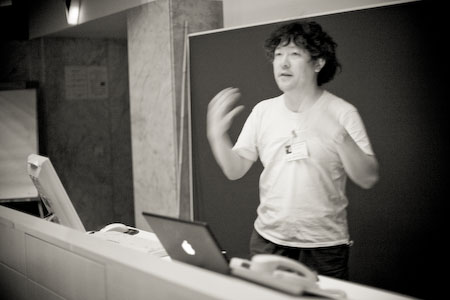Quantum Consciousness conference.
Lecture followed by questions and answers.
Ken Mogi
The origin of non-locality in consciousness
このMP3ファイルは 入田 丈司様からご提供をいただきました。
ここに御礼を申し上げます。
University of Salzburg, Austria
 MP3, 27.2MB, 30分
MP3, 27.2MB, 30分
講演する茂木健一郎

クオリア日記より抜粋
自分自身のトークは、
The origin of non-locality in consciousness
という題。
質疑応答が楽しかった。
二日間たっぷり量子力学と意識の
関係について考えた。
いろいろ議論もした。
魂の洗濯をして、戻る。
ボクは学部を出た後学士入学して、
博士課程に行ったから、計11年
大学生をしていた。
カナダのホストファミリーの
Vernaが呆れて、
Ken、あなたはeternal studentを
やるつもりかと言った。
もしそれだったら、お金持ちの
女の人と結婚しなさい、
そうすれば、一生勉強できるよ、
とVernaは言った。
お金持ちうんぬんはともかく、
「永遠の学生」というのは
そんなに悪くないと最近思う。
脳の学習はオープンエンドで、
学ぶことが沢山あるということは、
小学生でも、年経た研究者でも
変わりがない。
研究も、創造も、広義の学習の中に
含まれるとボクは思う。
外国の大学のカフェテリアで
ランチをとりながら
話をするというのは独特の
楽しさがあるが、
それも今日で終わり。
ヘルムート、フランシスと
喋りながら「最後の昼食」を摂った。
自分の発表が終わり、
それが一日の最後のセッションでもあった。
田森佳秀、院生のトミタくんと
旧市街にぶらぶらと歩いた。
" Qualia Journal "
The trumpet boy in Salzburg.
The trumpet boy in Salzburg
==========
この講演のアブストラクト(要旨)
The origin of non-locality in consciousness in the blog "THE ORIGIN OF CONSCIOUSNESS"
The origin of non-locality in consciousness
Ken Mogi
Sony Computer Science Laboratories & Tokyo Institute of Technology
Quantum mechanics, being an inseparable element of reality, naturally enters into the consideration of every phenomenon that occurs in the physical universe. As far as consciousness is an integral part of the reality as we understand it, quantum mechanics needs to be ultimately involved either directly or indirectly in its origin. In particular, the apparent non-locality and integrity in the phenomenology of consciousness and its physical correlates is suggestive of a quantum involvement.
Here I examine the nature of non-locality in the physical correlates of consciousness and its relation to quantum mechanics. The concept of the neural correlates of consciousness (Crick and Koch 2003), when pursued beyond the currently prevalent role as a practical framework in which to analyze neuropsychological data, logically necessitates a non-trivial emergence through the mutual relation between physical entities and events that constitute cognitive processes in the brain (Mach's principle in perception, Mogi 1999). Since from this standpoint the spatio-temporal histories sustaining the cognitive processes, including, but not necessarily restricted to, the action potentials of the neurons are the essential correlates of consciousness, non-locality becomes a logical necessity in the ingredients of consciousness.
Non-locality has been known to be an essential property of quantum mechanics since its early period (e.g., Einstein, Podolsky, & Rosen 1935). However, the combination of high temperature and large number of degrees of freedom involved in brain activities are usually regarded as definitely precluding any possible quantum effects. However, there exists possible routes of quantum involvement in macroscopic and "warm" phenomena such as brain processes. The key is in the fact that macroscopic objects, although ostensively obeying equations of Newtonian dynamics, rely on quantum effects for the very stability that makes them classic objects in the beginning.
Analysis of an information processing system usually starts from the assumption that its essence can be captured by following those parameters explicitly covarying with the information the system supposedly handles. Quantum mechanical effects hardly enter the picture when only explicitly varying parameters are considered. On the other hand, the implicitly sustaining structures that do not covary with the processed information can contribute to the phenomenal aspects of information, such as qualia and self-awareness.
The ubiquitous role of metacognition, the origin of subjective time, and the way spatio-temporally distributed activities are "compressed" into percepts in conscious experience, are discussed in the context of the implicit and explicit in cortical information processing.
References
Einstein, A., Podolsky, B., and Rosen, N. (1935) Can quantum-mechanical description of physical reality be considered complete? Phys. Rev. 47 777-780.
Mogi, K. (1999) Response Selectivity, Neuron Doctrine, and Mach's Principle. in Riegler, A. & Peschl, M. (eds.) Understanding Representation in the Cognitive Sciences. New York: Plenum Press. 127-134.
Crick, F. and Koch, C. (2003) A framework for consciousness. Nat. Neurosci., 6, 119-126.
Taya, F. and Mogi, K. (2004) The variant and invariant in perception. Forma, 19, pp.25-37.